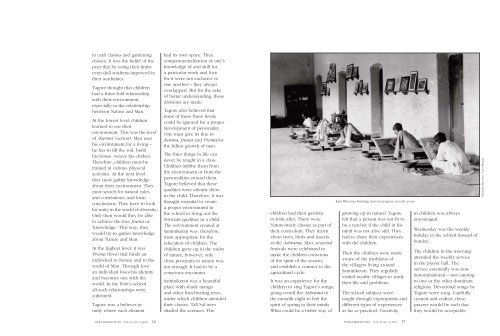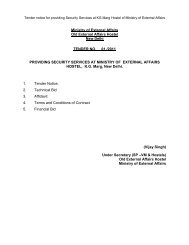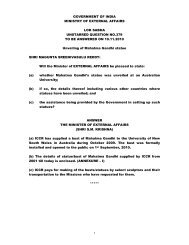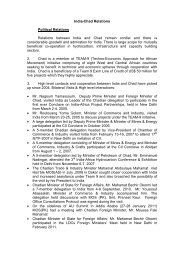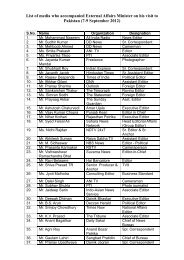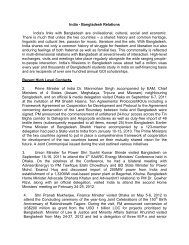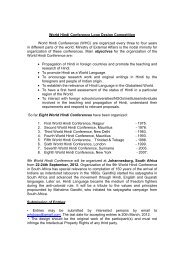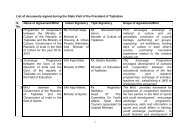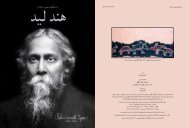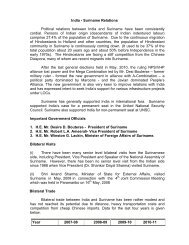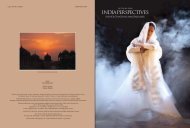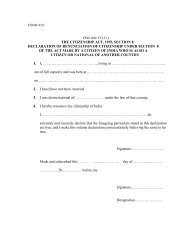IP_ Tagore Issue - Final.indd - high commission of india mauritius
IP_ Tagore Issue - Final.indd - high commission of india mauritius
IP_ Tagore Issue - Final.indd - high commission of india mauritius
Create successful ePaper yourself
Turn your PDF publications into a flip-book with our unique Google optimized e-Paper software.
in craft classes and gardeningclasses. It was the belief <strong>of</strong> thepoet that by using their limbseven dull students improved intheir academics.<strong>Tagore</strong> thought that childrenhad a three-fold relationshipwith their environment,especially in the relationshipbetween Nature and Man.At the lowest level childrenlearned to use theirenvironment. This was the level<strong>of</strong> ‘Karma’ (action). Man useshis environment for a living –he has to till the soil, buildhis house, weave his clothes.Therefore, children must betrained in various physicalactivities. At the next levelthey must gather knowledgeabout their environment. Theymust search for natural rulesand correlations, and formconclusions. They have to lookfor unity in the world <strong>of</strong> diversity.Only then would they be ableto achieve the true Jnana or‘knowledge’. This way, theywould try to gather knowledgeabout Nature and Man.At the <strong>high</strong>est level, it wasPrema (love) that binds anindividual to Nature and to theworld <strong>of</strong> Man. Through lovean individual loses his identityand becomes one with theworld. In the Poet’s schoolall such relationships werecultivated.<strong>Tagore</strong> was a believer inunity where each elementhad its own space. Thus,compartmentalization <strong>of</strong> one’sknowledge <strong>of</strong> and skill fora particular work and lovefor it were not exclusive toone another – they alwaysoverlapped. But for the sake<strong>of</strong> better understanding, thesedivisions are made.<strong>Tagore</strong> also believed thatnone <strong>of</strong> these three levelscould be ignored for a properdevelopment <strong>of</strong> personality.One must give its due toKarma, Jnana and Prema forthe fullest growth <strong>of</strong> man.The finer things in life cannever be taught in a class.Children imbibe them fromthe environment or from thepersonalities around them.<strong>Tagore</strong> believed that thesequalities were already therein the child. Therefore, it wasthought essential to createa proper environment inthe school to bring out thedormant qualities in a child.The environment created atSantiniketan was, therefore,most appropriate for theeducation <strong>of</strong> children. Thechildren grew up in the midst<strong>of</strong> nature, however, onlyclose proximity to nature wasnot enough. It had to be aconscious encounter.Santiniketan was a beautifulplace with shady mangoand other fruit-bearing trees,under which children attendedtheir classes. Tall Sal treesshaded the avenues. Thechildren had their gardensto look after. There wereNature-study classes as part <strong>of</strong>their curriculum. They learntabout trees, birds and insectsat the Ashrama. Also, seasonalfestivals were celebrated tomake the children conscious<strong>of</strong> the spirit <strong>of</strong> the season,and establish a connect to theagricultural cycle.It was an experience for thechildren to sing <strong>Tagore</strong>’s songs,going round the Ashrama inthe moonlit night to feel thespirit <strong>of</strong> spring in their minds.What could be a better way <strong>of</strong>Kala Bhavana Painting class in progress in early yearsgrowing up in nature? <strong>Tagore</strong>felt that a person was not fit tobe a teacher if the child in hismind was not alive still. Theyhad to share their experienceswith the children.Then the children were madeaware <strong>of</strong> the problems <strong>of</strong>the villagers living aroundSantiniketan. They regularlyvisited nearby villages to studytheir life and problems.The school subjects weretaught through experiments anddifferent types <strong>of</strong> experiencesas far as practical. Creativityin children was alwaysencouraged.Wednesday was the weeklyholiday in the school instead <strong>of</strong>Sunday.The children in the morningattended the weekly servicein the prayer hall. Theservice essentially was nondenominational– not cateringto one or the other dominantreligions. Devotional songs by<strong>Tagore</strong> were sung. Carefullycreated and crafted, theseprayers would be such thatthey would be acceptableRabindra-Bhavana, Visva-BharatiINDIA PERSPECTIVES VOL 24 NO. 2/2010 16 INDIA PERSPECTIVES VOL 24 NO. 2/2010 17


